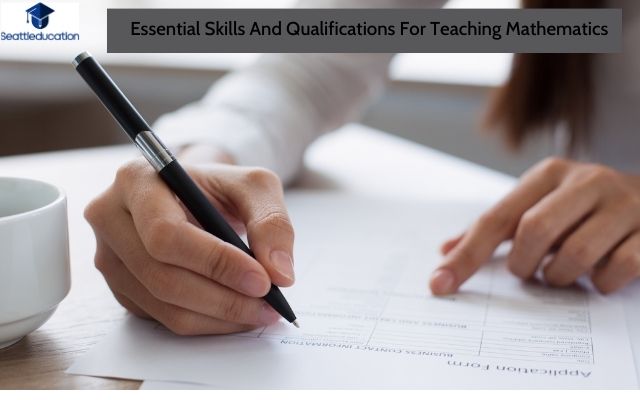Teaching Careers In Mathematics: Opportunities& Challenges
Teaching Careers In Mathematics can be a rewarding and challenging experience. It is an occupation that requires patience, dedication, and a passion for the subject matter. With math being so integral to our lives, it’s no wonder why many educators choose to pursue teaching roles in this field.
In this article, we will explore what it takes to become a successful teacher of mathematics, as well as some of the benefits that come with such a career path.
Let’s get started!
Introduction
It’s no secret that mathematics plays an important role in our lives. Whether we realize it or not, numbers and equations can be found everywhere – from the measurements of a building to the ingredients in a recipe. As such, teaching math is arguably one of the most important jobs out there. It’s teachers who foster a love for this subject in their students; helping them understand how useful it really is.
This guide will provide an overview of what it takes to become a teacher within the field of mathematics – from understanding certification requirements to finding job opportunities and even career growth options. We’ll look at all aspects of pursuing a teaching career in math’s and provide guidance so you can make informed decisions about your future.
Essential Skills And Qualifications For Teaching Mathematics
I think educational background is an important prerequisite for teaching mathematics, so having a degree in a related field is key. Additionally, obtaining teaching certifications can be beneficial in order to become qualified for the job. Lastly, personal skills such as strong communication and critical thinking are essential for being an effective math teacher.
Educational Background
When it comes to teaching mathematics, having a solid educational background is key. To become qualified in the field, one must obtain at least a bachelor’s degree and preferably pursue higher education such as a master’s degree.

Additionally, there are state-specific requirements and national certifications that prospective teachers need to fulfill before they can enter the profession. Consequently, this ensures that only those with the right qualifications can teach math effectively.
Teaching Certifications
Moving on, teaching certifications are also essential when it comes to becoming a math teacher. To become qualified in the field, one must have valid national certifications and fulfill state-specific requirements. These criteria guarantee that those with appropriate qualifications can enter the profession and teach mathematics effectively.
In conclusion, obtaining the necessary educational background as well as fulfilling these certification requirements is an important step for anyone looking to pursue a career in teaching mathematics.
Personal Skills
Moving on, personal skills and qualities are also essential for anyone wanting to become a math teacher. Having strong communication skills is key in order to effectively teach students the subject matter, while patience and adaptability help with managing different personalities in the classroom.
Above all else, however, it’s important to have a passion for mathematics itself so that you can provide exciting lessons and motivate your pupils. All these attributes come together to make an effective math teacher who will be able to give their students the best education possible.
Various Career Paths In Mathematics Education
Let’s talk about the various career paths in mathematics education. Specifically, let’s discuss elementary maths teaching and university maths teaching.

Elementary Maths Teaching
Elementary school teaching provides an important opportunity to introduce children to the fundamentals of math and help them develop a love for learning. As teachers, we are responsible for guiding young students in their journey to discover and understand mathematical concepts that will serve as building blocks for future success.
Through creative activities, engaging lessons, and hands-on projects, elementary school educators can instill a passion in kids that will stay with them throughout their lives. By introducing basic arithmetic operations such as addition, subtraction, multiplication and division early on, we can prepare our students for more advanced studies in mathematics later on.
It’s an incredibly rewarding profession that requires patience and dedication – but it is one of the most fulfilling experiences you could ever have!
University Maths Teaching
Moving onto university maths teaching, professors have the amazing opportunity to mentor students in advanced topics and research projects. They can use their expertise to help undergraduates develop a strong foundation of knowledge and understanding that will stay with them for life.
Professors must remain up-to-date on current trends in mathematics, as well as teach classic theories and techniques – all while making sure their classes are engaging for the students. It’s an exciting challenge!
Teaching at universities also allows teachers to explore new ideas and share their own discoveries with eager minds. This kind of work requires tremendous dedication, but it is incredibly rewarding when one sees the growth of his or her students over time.
Challenges And Rewards Of Teaching Mathematics
As mathematics educators, we have the incredible opportunity to foster a love of learning in our students and to prepare them for success. Applying creative teaching methods to engage with kids who are struggling with math or who may feel overwhelmed can be incredibly rewarding; it is an amazing feeling when we witness breakthroughs in understanding that help motivate these students to further explore their passions.
No matter how much effort we put into inspiring children and helping them overcome anxiety around learning math, there will also be challenges along the way. Dealing with frustrated parents and managing difficult classrooms are part of the job, but so is connecting with those same parents and discovering ways to bring out the best in all kinds of learners.
Though challenging at times, teaching mathematics provides us with opportunities to make meaningful contributions towards shaping young minds while developing new skills ourselves. We get to experience moments of great satisfaction as well as learn from our mistakes – both aspects being essential parts of any career path.
Tips For Creating An Engaging Mathematics Classroom
Teaching mathematics can be a challenge, but with the right strategies, it doesn’t have to be. Here are some practical tips for creating an engaging classroom environment:

1. Incorporate hands-on activities and manipulatives into your lessons as much as possible. This helps students connect math concepts to real life situations;
2. Integrate technology and online resources into every lesson – from practice problems to interactive simulations;
3. Encourage collaboration and teamwork, so that everyone is able to participate in discussions about math topics, share ideas, and learn from each other.
By following these simple tips you can create an exciting learning environment where students feel empowered to explore their understanding of mathematics without fear of failure or judgment. It will also help them become more independent problem solvers who persevere in challenging tasks and think critically about mathematical solutions.
Professional Development Opportunities For Mathematics Educators
Mathematics educators have numerous professional development opportunities available to them. From conferences and workshops, to online courses and certifications, there are a variety of ways for teachers to stay up-to-date with the latest trends in education while furthering their own careers in mathematics.
| Professional Development Opportunities | Benefits | Strategies & Suggestions |
| Conferences & Workshops | Network with peers; learn new teaching strategies; get inspired by leaders in the field | Research upcoming events that may be relevant to your area of expertise; take advantage of discounted rates when possible; attend sessions related to both current topics as well as emerging trends in mathematics education |
| Professional Organizations | Learn from experienced professionals; gain access to resources such as publications, job postings, and networking opportunities | Join an organization whose mission aligns with your values and goals; prioritize attending annual meetings or webinars hosted by organizations you’re affiliated with whenever feasible; submit articles for publication if you’re feeling particularly ambitious! |
| Online Courses & Certifications | Stay ahead of the curve on new technologies and methods being used in the classroom; build credentials and experience without having to leave home or work full time | Take advantage of free trial offers before committing more money into a course/certification program; look out for any special discounts being offered at certain times throughout the year (i.e., holidays); create achievable short-term milestones within each course so that progress can easily be tracked |
| Networking & Mentorship Opportunities | Collaborate with other mathematicians who share similar interests or areas of expertise ; benefit from one another’s experiences and skillsets | Reach out directly through email or social media channels like LinkedIn or Twitter – make sure you always include a brief introduction about yourself along with why you think working together would be mutually beneficial ; set aside regular “mentor hours” where colleagues can ask questions or discuss challenges they’ve encountered in their classrooms |
By exploring these various professional development options, mathematics educators can ensure they remain knowledgeable about the ever-evolving field while gaining invaluable insight into best practices for delivering high-quality instruction. With this knowledge, teachers can confidently guide students towards success no matter what subject is being taught.
Job Search Strategies For Mathematics Educators
In order to be successful in their job search, mathematics educators must understand how to tailor a resume and cover letter for the specific position they are applying for. Additionally, being able to effectively network within the education community can open up new opportunities that may not be advertised.
The following strategies should provide guidance on navigating through the job search process:
– Tailoring Your Resume and Cover Letter:
– Highlight qualifications relevant to the teaching role
– Use action words to emphasize your strengths
– Research industry standard formatting guidelines
– Networking Within The Education Community:
– Reach out to fellow colleagues who already work in a similar field
– Attend conferences or events related to your discipline
– Join online forums or groups dedicated to teaching careers in mathematics
Preparing for job interviews is another key component of any job search. Being well prepared with examples from past experiences, reviewing common interview questions and answers, and researching the school district prior to an interview will help ensure you make a good impression.
Alternative teaching opportunities such as private tutoring or working at educational institutions offer additional options if traditional classroom teaching isn’t desired. Exploring these alternatives could lead to further career growth and development.
Conclusion
In conclusion, teaching mathematics is an incredibly rewarding experience. With the right qualifications and a passion for math, anyone can pursue this career path. It’s important to consider salary expectations before entering this field, but it’s also worth noting that there are plenty of online opportunities available as well.
You’ll need at least a bachelor’s degree in mathematics or related subject, plus special certifications and/or experience depending on where you want to teach. But overall, if you’re passionate about math and have the necessary qualifications, teaching mathematics could be the perfect fit for your career goals!






